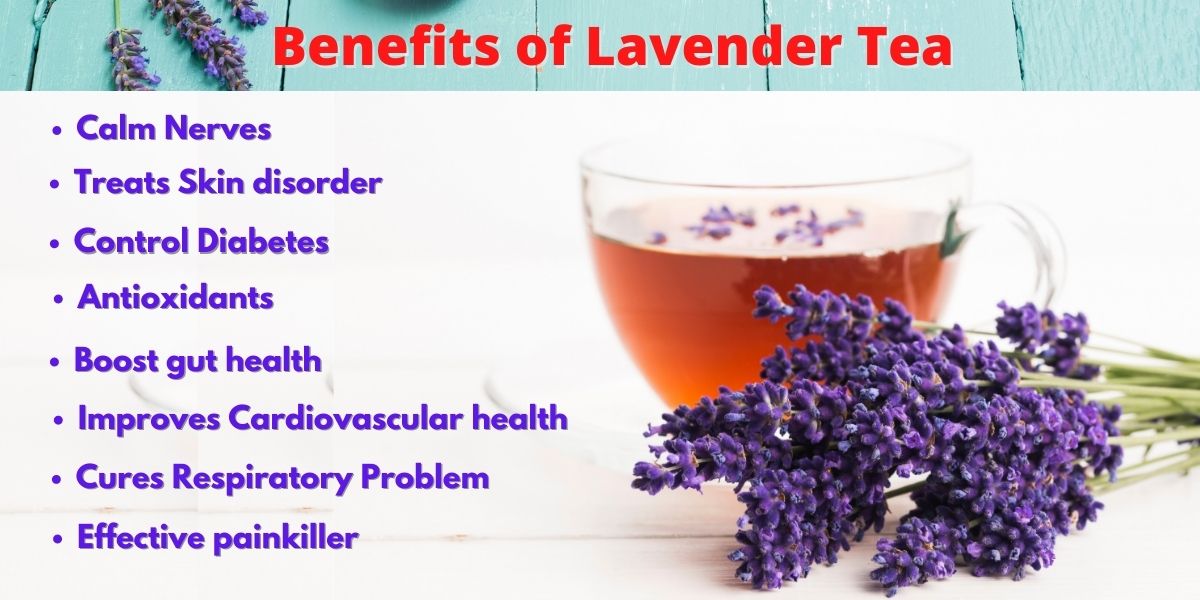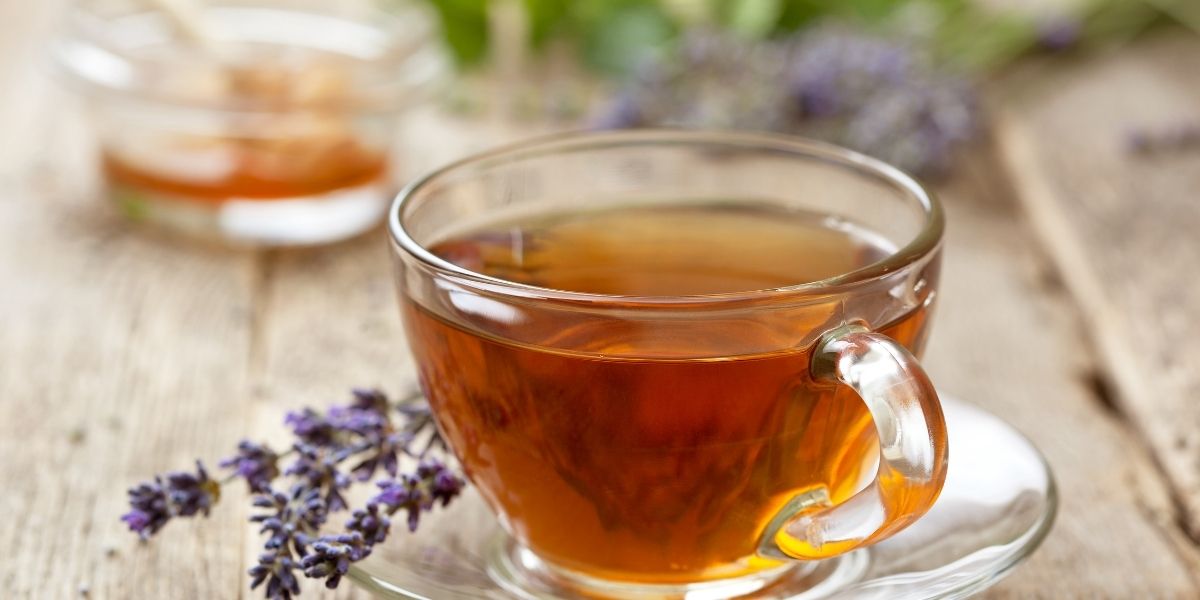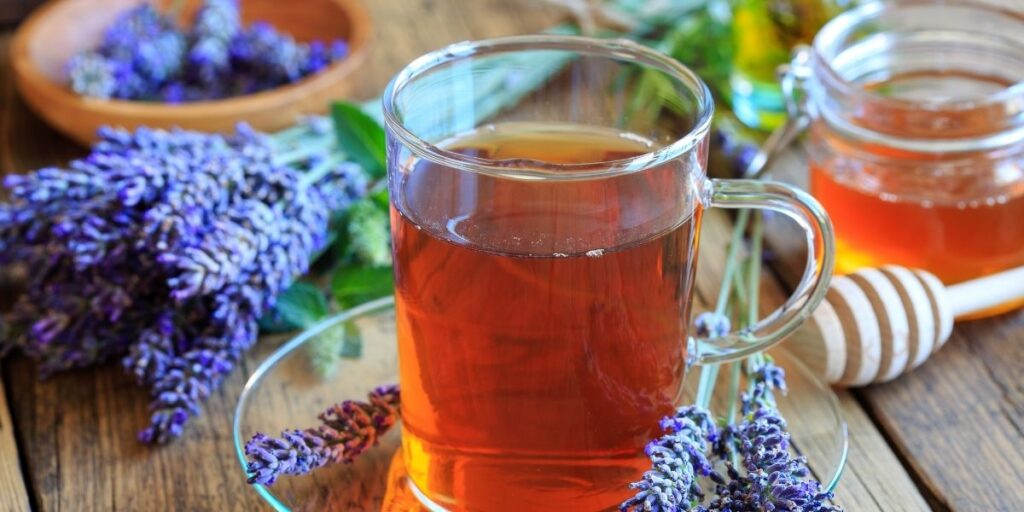What is Lavender Tea?
Lavender tea is a herbal tea made from lavender flowers or other plants with a similar flavor. Some individuals consume it as a sort of alternative medicine or to unwind after a busy day.
It has also been used in aromatherapy for ages, and some people feel that the perfume can help them relax. For those who have difficulties sleeping, it may be effective as a mild sedative. Vitamin C is also abundant in lavender tea, which is beneficial to the body’s immune system.
The technique of brewing lavender tea is pretty simple, and those who have access to this wild medicinal herb can collect the blossoms, dry them, and then infuse them with boiling water.
Uses of Lavender
The lavender flower and oil are used to produce medication. Anxiety, tension, and insomnia are all treated with lavender. It is also used for depression, dementia, post-surgical pain, and various other ailments, but there’s no clear scientific evidence to back up many of these claims.
Though research is limited and primarily focuses on lavender extracts, this tea aims to calm nerves, contribute to better sleep, enhance skin health, and provide many other advantages. Smooth muscle function is improved, and stiffness is reduced.
Most significantly, it promotes healthy digestion and improves your gut’s overall mineral absorption efficiency. Because of its remarkable skin-beneficial characteristics, this herbal tea is a cure for treating acne and other skin diseases and has a distinct smell and pleasant scent.
Benefits of Lavender Tea
Insomnia, elevated anxiety, gastrointestinal trouble, skin irritation, and headaches may be relieved by drinking lavender tea. Whatever ails you, the benefits of lavender tea will almost certainly be able to help. Many additional advantages are listed below: –

1. Inherent Calming Property:– It has active ingredients, making it perfect for persons who suffer from chronic tension and anxiety. It can trigger the release of neurotransmitters that counteract the body’s excess stress hormones, reducing mental weariness. Similarly, this tea may have analgesic properties, reducing sensitivity to unpleasant sensations in the body and mind.
2. Improve Skin Disorder: Free radicals are byproducts of cellular metabolism. The antioxidants and volatile chemicals in lavender may seek out and eliminate them in the body. These free radicals can cause chronic illness, premature aging, wrinkles, and inflammation, but lavender tea can help alleviate these symptoms while enhancing your skin quality.
3. May Reduces Swelling:- Hangovers, fevers, skin rashes, symptoms of arthritis, and some joint issues are just a few of the inflammatory processes that lavender tea might help with. Inflammation can manifest itself in various ways and contribute to oxidative stress, but the active components in this tea may be able to counteract the body’s natural reactions successfully.
4. Controls Diabetes:– Lavender tea is used to manage weight gain, liver and kidney functions, including antioxidant deficiency, free radical killing, other dysfunctions; blood sugar levels; and metabolic diseases.
5. Rich in Antioxidants:– Lavender is effective against colds and viruses, as well as certain types of cancer. Lavender oil’s antioxidants fight free radicals that can lead to cancer, kill germs and bacteria, and even improve the effectiveness of other antioxidants like SOD, glutathione, and catalyzes.
6. Good for the Brain:– Breathing lavender oil’s fragrance or consuming tea can boost cognitive function and reduce oxidative damage. Because of these two advantages, there is a lower risk of diseases like Alzheimer’s and Huntington’s.
7. Provides Sound Sleep:– Because of its relaxing aroma, lavender can work as a sedative for most individuals. The most significant advantage of using lavender to help you sleep rather than an over-the-counter sleeping drug is that lavender does not make you tired, has no side effects, and is entirely safe. It should help you relax if you rub it into your arms and the base of your shoulders.
8. Maintains the Gastrointestinal System:- Drinking lavender-infused tea can help to enhance your digestive health and alleviate the symptoms of various digestive diseases. Lavender’s inherent ability to ease inflammation can aid in the improvement of muscle function. Lavender tea has antipyretic properties that help in the reduction of stomach discomfort. It can also relieve stomach pains and reduce the symptoms of diarrhea, heartburn, and despair.
You might also like: Acid Reflux Dietary Modification
9. Improve Cardiovascular Health:- You can improve your heart health and lower your risk of heart disease by drinking lavender tea daily. This means that drinking tea made from a lavender bud reduces your risk of developing high cholesterol. Infections can’t build up in the arteries and capillaries if you take the proper steps. Making lavender tea can also help to prevent atherosclerosis and cardiovascular disease.
10. Get Rid of Muscle Aches:- Taking black lavender tea regularly can aid with muscle discomfort and tightness. Lavender is a natural way of preventing muscle spasms, detoxifying and reducing inflammation in the body. Making tea with lavender can also aid with stamina, so if you work out frequently, it can help you improve your endurance.
11. Make Respiratory Health Better:- Lavender is an anti-inflammatory herb. These qualities can aid with bronchial asthma and can reduce allergic irritation when administered as a medication. Tea made with lavender can help clear the airways and improve breathing, especially for persons who have trouble breathing.
12. Weight Loss with Lavender Tea:- Calories in Lavender Tea Per 8-oz cup of this infusion, there are only eight calories. As a result, it’s a fantastic substitute for sugary, fatty soft drinks. Furthermore, some scientists believe that it increases fat cell metabolism. This could suggest that it helps the body burn fat more quickly and efficiently, boosting your chances of losing weight while exercising.
Lavender Tea Recipes
Four types of tea are widely consumed; let’s discuss:-
1. Simple Lavender Tea

Step 1
Boil the water
Bring filtered, purified, or spring water to a rolling boil in a medium-sized teapot. When brewing teas, never use tap or distilled water. These types of water can affect the flavor of tea leaves and flower buds and prevent them from fully infusing flavor.
Step 2
Infuse Lavender Flowers in Water.
Place the lavender flowers into the teapot in a tea ball, tea infuser, or tea sachet. Allow 10 minutes for the flower buds to steep in the teapot.
Step 3
Enjoy and Serve
Remove the tea implements and lavender buds from the kettle. Pour the hot water into the teacups with care, and enjoy the fresh, floral smell of simple lavender tea. To make this simple tea into lavender honey tea, add a splash of honey.
2. Lavender and Chamomile Brew

Step 1
Get the Flower Buds Ready
Make a ball or sachet with one teaspoon of lavender and chamomile buds from the garden. If you like, you can also use tea bags or dried lavender. Using a funnel, pour the fresh leaves into a large sachet opening to make your teabag.
Step 2
Boil the water
Bring eight ounces of water to a boil in a pot on the stovetop or in a tea kettle. Remove the water from the fire once it has reached a rolling boil and pour it into your cup.
Step 3
Plate and serve
Pour the boiling water over the tea leaves and steep for 10 minutes. Remove the tea ball or sachet from the cup and take a sip.
3. Lavender and Mint Tea

Lavender’s intense, flowery aromas complement the refreshing, tingling scents of mint leaves nicely.
Step 1
Get the Leaves Ready
In a medium saucepan, combine a quarter cup of fresh lavender petals and 1 cup of fresh mint leaves.
Step 2
Boil the water
Bring the water to a boil over the leaves and buds. Reduce the heat to medium and allow the brew to simmer for 5 to 10 minutes. Taste every minute till you get the flavors you want.
Step 3
Strain the mixture and serve it.
Using a fine-mesh strainer, sift off the mint leaves and lavender petals. Fill a cup with the infused water and drink.
4. Lavender and Berry Iced Tea

In the summer, nothing beats a nice, refreshing cup of iced tea. With this lavender and berry tea recipe, you may have a deliciously relaxing beverage as you sail into summer.
Step 1
Make Lavender Tea
Follow the steps in the simple lavender tea recipe to make lavender tea. Bring a pot of water to a boil, then add the lavender flowers to steep.
Step 2
Chill the Tea
Put the tea kettle or glass jug in the fridge to chill. To intensify the flowery flavor, leave the lavender buds in the tea. Allow for 1 hour of rest before removing.
Step 3
Make it sweeter
In a medium-sized pan, combine 50 grams of sugar and 25 grams of sugar syrup. Bring the mixture to a boil, stirring regularly to prevent it from burning. Remove the sugar from the heat and set it aside to cool completely before adding it to the lavender tea jug.
Step 4
Mix in the fruit and chill the pitcher
Strawberries, blueberries, or raspberries, for example, can be added. To the iced tea pitcher, add seven large sliced strawberries or a handful of the other berries. Return the pitcher to the refrigerator for another 3 hours.
Step 5
Serve
Add the lavender strawberry tea to tall cups filled with ice cubes. Serve immediately with a strawberry or lemon slice as a seasoning.
Side Effects of Lavender Tea
There are a few things to bear in mind before drinking lavender tea. Some persons who suffer from allergies should avoid drinking lavender tea and shelling lavender flowers. People with allergies to lavender flowers may experience trouble breathing, skin rashes, and throat irritation if they use it to make tea.
Pregnant women should not consume lavender tea because it may cause issues later in their gestation. This tea has anticoagulant effects, which can benefit heart health, but it can be problematic if you are already on blood-thinning medication, especially before surgery. Excessive lavender tea consumption can cause skin irritation and rashes and increase skin sensitivity to the sun.
If you feel any adverse effects, you should stop drinking lavender tea right away. It should also be avoided when combined with sedatives, as it may cause drowsiness. Before introducing this tea to your daily or weekly health regimen, consult your doctor if you think you could be at risk for a prescription interaction.
Chamomile and Lavender Tea
When chamomile infused with lavender, it turned into a great evening – morning tea option. When we include chamomile- lavender tea in our daily routine, we gain health properties like relaxing and soothing effects, improving sleep quality, and reducing depression.
Combining these two herbs into a single blend may provide you with the advantages of both plants while also making it easier to fall asleep. Even so, the lavender with chamomile combination isn’t one of the world’s most robust sleepy time teas, and it might be a good choice for a peaceful tea time at any time of day.
Both herbs have a sedative effect that may be just enough to make you feel calm in a stressful circumstance. Both chamomile and lavender have been shown to help with stomach issues and digestion. Sipping this tea helps maintain skin health, facilitates digestion, promotes rejuvenation, fights acne, blemishes, boosts the immune system. Both of them are rich in antioxidants & other bio-active compounds.
Conclusion
The lavender flower and oil are applied in the manufacture of pharmaceuticals. Most importantly, it increases your gut’s overall mineral absorption efficiency and promotes digestive health. It contains active components that make it ideal for people who suffer from persistent nervousness. It has the potential to help people with skin problems. Weight gain, liver, and renal functions, and antioxidant deficiencies, are all treated with lavender tea.
Drinking lavender-infused tea can improve your digestive health and relieve the symptoms of a variety of digestive disorders. Four different types of tea are often drunk. It feels fantastic to drink caffeine-free chamomile and lavender tea.
FAQ
1. Is lavender tea good for you?
Yes, Vomiting, nausea, intestinal gas, upset stomach, and abdominal puffiness can all be relieved with lavender tea. Lavender is used to treating pain from headaches, sprains, toothaches, and sores, in addition to stomach disorders.
2. What nutrients are in Lavender Tea?
Vitamin C, calcium, and magnesium are all present in this. These nutrients help the human body fight bacterial, fungal, and viral illnesses by strengthening the immune system.
3. How many Calories are in Lavender Tea?
8 kcal in 1 cup.
4. Can I drink Lavender tea every day?
Avoid consuming daily as daily consumption can lead to hormonal imbalance. Recommended healthy dose is:- 1 cup (250 mL) of lavender tea per day for two weeks.
5. Is lavender tea good for high blood pressure?
Some people may benefit from lavender since it lowers blood pressure. If you combine lavender with blood pressure drugs, your blood pressure may drop too low. If you’re taking blood pressure medicine, don’t take too much lavender.
6. Is lavender tea good for anxiety?
Lavender herbal tea can help with depression and anxiety, and because it’s cheap and easy to get, it’s recommended to supplement other treatments for stress and despair.
7. Does lavender tea make you sleepy?
Lavender promotes sleep quality because of its relaxing scent, which can help you relax and fall asleep faster. The benefits of lavender tea on sleep quality are inconclusive.
8. How do you drink lavender tea?
You can consume lavender tea by preparing it with chamomile, honey, and other herbs. For the detailed recipe, you can read above mentioned four varieties of tea.
9. What tea goes best with lavender?
Chamomile goes best with it. It has traditionally been used to soothe and soften the skin and heal wounds, irritations, and other issues.
10. Is there caffeine in lavender tea?
No, it is caffeine-free
11. Can lavender tea help you lose weight?
Lavender tea has numerous health advantages for the mind, body, and soul. It can benefit your mental health by reducing minor anxiety and stress, for example. It lowers blood pressure and helps weight loss when it comes to the body.
12. Is lavender tea safe during pregnancy?
Yes, it is safe to consume during pregnancy as it is loaded with antioxidants and vitamin C. It should be consumed in moderation to avoid toxicity.
13. Is too much lavender tea bad for you?
Lavender tea should not be consumed by people who are allergic to lavender flowers or other flowering plants. People who are allergic to these flowers may experience trouble breathing, a rash on their skin, and inflammation in their throat. Excess consumption can lead to toxicity.

